by Dr. Janine Darby
Did you know that 13.7 million children and adolescents are overweight just in the United States alone?
Even worse, obesity at such a young age is crippling leaving many children susceptible to…
- Mobility issues.
- Type 2 diabetes.
- High blood pressure.
- Cardiovascular disease.
- Mental health issues.
- Sleep apnea.
- Chronic joint pain.
- And other health complications.
- If you have a child who is obese (or simply worry about your child’s health in general), this information might sound scary.
The good news…
It’s NEVER too late to put healthy habits in place that will help your entire family better manage their weight and live healthy, active lifestyles. In honor of Childhood Obesity Awareness Month here are a few things I recommend to help your kids avoid weight issues that will follow them into adulthood…
Get Your Kids Involved In Sports and Activities

Getting exercise is an important part of maintaining a healthy weight. But, let’s be honest…not many kids enjoy hitting the gym to run on the treadmill or lift weights.
To get your kid off the couch, I recommended getting him/her involved in a sport or activity.
Find out what your kid is interested in–whether it be soccer, a dance class, or martial arts. Then let your kid give it a try!
Tip: If you’re worried about the expense of sports/activities check out your local YMCA. With a small membership fee, you’ll get access to a bunch of different activity options that won’t break the bank.
If your child is not into sports, that’s ok! Any activity (art class, book club, etc.) that gets your kid out of the house and interacting with other people is great! The key is encouraging your kid to put down the gaming controller or remote control for a few hours a day!
Monitor Your Child’s Mental Health

We live in a time where many kids experience a crazy amount of stress.
Between getting good grades in school, performing well in sports/activities, the pressures of social media, and general social and emotional growing pains, it’s easy for children to become overwhelmed, anxious, or depressed. Unfortunately, anxiety/stress/depression can lead to poor eating habits causing kids to pack on weight.
You can avoid this issue while routinely checking in on your children. Have discussions about how they are feeling or why they might be stressed out.
If need be, get your kid counseling. There is absolutely no shame in taking your children to see a therapist. It doesn’t mean you’re a bad parent. Sometimes kids simply need to develop coping skills or have someone to talk to outside of your family unit.
When you’re proactive about your kid’s mental health, you can avoid dangerous problems like binge eating down the road!
Stock Your Fridge and Pantry with Healthy Options

If you don’t keep junk in your home, your kids won’t have access to unhealthy options. It’s as simple as that!
Instead of stocking your shelves with cookies and chips, opt for fresh fruits, veggies, and other healthy choices. A few snack ideas most kids love include…
- Apples and peanut butter.
- Yogurt and granola.
- Carrot sticks and hummus.
- Berries.
- Popcorn.
- Trail mix.
- Cheese sticks.
- Hard-boiled eggs.
- Green smoothies.
Discuss the Importance of Moderation

Let’s be honest…EVERYONE loves to indulge in a treat from time to time. And this is perfectly ok!
In fact, depriving your kids of all treats can cause various eating issues such as binge eating. The last thing you want is for your children to be sneaking around you and hoarding food without you knowing.
How do you manage the balance between healthy choices and an occasional treat? Have a conversation about the importance of moderation!
It’s so important that kids understand that eating a chocolate bar every day after school isn’t a healthy option. However, going out for ice cream on a weekend after a football game is a perfectly acceptable choice (unless there are severe underlying health issues that would make this a bad idea).
Kids who understand how to balance their diets often go on to lead normal healthy lives as they develop the skills to understand when it’s appropriate to indulge in a treat and when they should stick to a healthier option.
Bring Your Children In for a Yearly Physical

Aside from promoting a healthy diet in your home and getting your kids up and active, ensuring your children attend their yearly medical appointments is vital to a healthy life.
Your child’s physician can provide you with the medical information you need to keep your kid healthy based on your child’s own unique needs.
Better yet, a doctor can help diagnose any health issues that might be contributing to your kids’ weight gain if your child is already struggling with weight issues. For example, you may lead a healthy active lifestyle but no matter what you do your kid continues to gain weight.
Is it possible that your child is diabetic? Is your kid suffering from a hormonal imbalance? Is your son/daughter on a medication that makes maintaining a healthy weight difficult?
All of these questions can be addressed by a professional in order to set your kid up for optimal health in the future.
Lead By Example

It’s no secret that children look up to their parents and tend to adopt the habits you exhibit. This is why it’s more important than ever to set a good example.
After all, it wouldn’t be fair to eat a bucket of fried chicken while making your kid eat a salad.
It’s up to you to set the standard. Eat healthily. Stay hydrated. Keep active. Then encourage your kids to follow in your footsteps.
The information contained in this article is for educational and informational purposes only and is not intended as health or medical advice. Always consult a physician or other qualified health provider regarding any questions you may have about a medical condition or health objectives.





